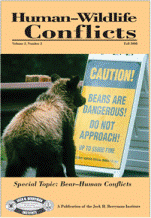Center, Internet, Wildlife Damage Management

Human–Wildlife Interactions
Date of this Version
Spring 2009
Document Type
Article
Abstract
Society is divided over the question of how exotic species should be managed. As an example, consider the attitude of U.S. citizens toward 1 exotic species, mute swans (Cygnus lotor), which were imported from Europe. These birds have much going for them. Their bright, white plumage, their eagerness to swim our way for bread, and their prominence in legends has allowed them to conquer our hearts (Conover and McIvor 1993). Yet, many ecologists, wildlife biologists, and avid birders argue that we should spend time and money to eradicate mute swans from the U.S. because they are an exotic species, while concomitantly spending time and money to protect native birds from eradication. Such a seeming contradiction results from our ambivalent attitude towards exotic species.


Comments
Published in Human–Wildlife Conflicts 3(1):1–2, Spring 2009. Published and copyright by Jack H. Berryman Institute http://www.berrymaninstitute.org/journal/index.html